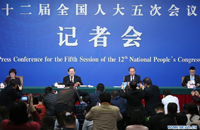Intellectual property must be better protected
DURING THE FIFTH PLENARY SESSION of the 12th National People's Congress, China's top legislature, Huang Jianping, a deputy from South China's Guangdong province, said the robust growth of virtual economy has taken a toll on bricks-and-mortar enterprises. Beijing News commented on Monday:
Huang, who is also the chairman of Guangdong Wonderful Ceramics Co Ltd, has good reason to fire away at the dark side of the internet-driven economy. Like many manufacturing veterans, he is infuriated by the fact that many online retailers, despite their blatant infringements of the intellectual property rights of other manufacturers, are not held accountable due to the difficulty in holding them to account.
In fact, Jack Ma, founder of the e-commerce giant Alibaba Group, recently commented on the intellectual property rights issue, saying counterfeiting should be dealt with in the way drunken driving has been handled. In other words, the root cause of the unruly counterfeiting is that intellectual property is not under proper protection.
Countries at the early stages of industrialization are tempted to emulate the success of industrial leaders. In China's case, when the reform and opening-up policy was launched in the late 1970s, resources were scarce and most citizens could not afford quality products. That explains why many copycats would focus on manufacturing affordable goods even at the risk of violating other companies' intellectual property rights.
Although the days of scarcity are in the past, the protection of intellectual property rights has made limited progress as enterprises are less motivated to pursue innovations. Being an industrial trailblazer, to some extent, means higher costs but not necessarily more gains because copycats can achieve more success simply by "improving" on their pioneering products.
Some enterprises put profitability in front of legality, especially when the production cost keeps rising these days. And even if they are caught the legal consequences of their actions are limited.
The truth is that amid the country's economic transition many primitive Chinese manufacturers are losing in the competition with their Southeast Asian counterparts, which have become more attractive to foreign investors that favor low-cost labor. It is lackluster innovation that has led to excessive capacity in China and dwindling profits in manufacturing, not the internet economy.

























